Coronavirus: What are independent supermarkets doing to help?
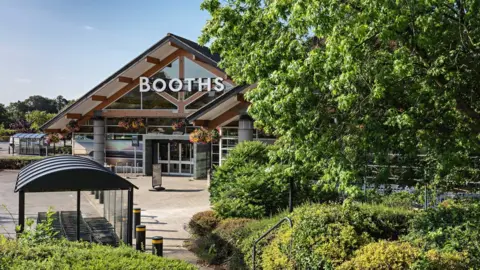 Booths
BoothsBig name supermarkets are cracking down on stock-pilers and saving delivery slots for older people during the coronavirus pandemic. Independent supermarkets are similarly overwhelmed by unprecedented demand for essentials but have tried to help communities in other ways.
Panic-buyers had stripped shelves of toilet roll, pasta, hand sanitiser and paracetamol well before Boris Johnson announced the UK should stay home to prevent the spread of Covid-19.
It led to chains like Sainsbury's and Asda putting limits on certain purchases and giving priority to elderly shoppers.
Tuffins, a family-run supermarket with stores in Craven Arms, Shropshire, and Builth Wells and Welshpool in Wales, has followed suit with some restrictions on items, but is offering other services to help.
On Wednesday, the store received an order of 7,500 cases of goods - three times its usual delivery. Director Harry Delves said the level of bulk-buying was "completely unprecedented".
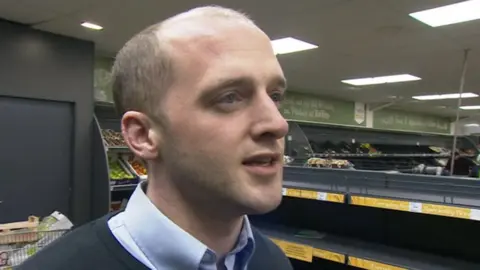
"No-one has ever seen it like this in our trade," he told BBC Midlands Today.
"Yes it's empty today but we are going to be ok tomorrow morning. We believe everyone should be able to shop and buy everything they need."
On Monday, the store will launch a click-and-collect and free delivery service for those within a 10-mile (16km) radius. Customers further afield can email the store directly and arrange delivery, said Mr Delves.
"We've never done that before but with a large proportion of our loyal customers having to stay away, we have to help them," he said.
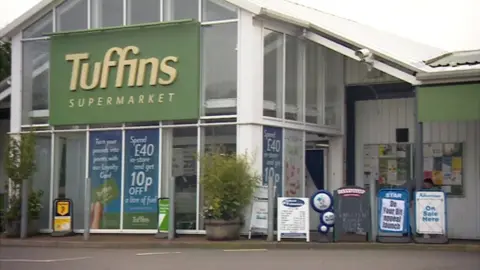
Stans Superstore in Oswestry, Shropshire, is one of the largest single-site independent supermarkets in England.
Co-owner Peter Faulks, a son of the founder Stan Faulks, said he had started restricting sales of toilet rolls on Tuesday.
"[We] may have to consider rationing other goods if the situation gets worse. We're coping. We have got most things in store. Staff are working very, very hard, working extra hours."
He said being independent meant "we can buy from anywhere" - meaning, in theory, that stock shortages are less of a problem for the store.
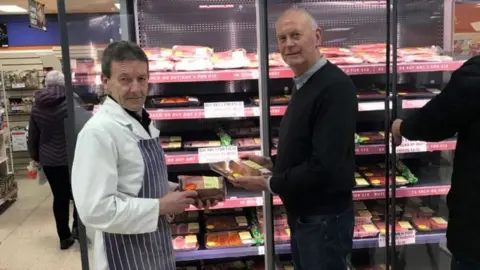 Peter Faulks
Peter Faulks"For example, bread - we ran out of supplies for two hours, went to local independent bakeries and picked bread up.
"There's been the odd half-day when we've run out of toilet rolls. At the moment we've got bread, meat, fruit and vegetables, toilet rolls."
The store had always offered deliveries to elderly people and this has been extended by a few miles, he said.

You might also like:
Stans bought 70% of its stock from the National Independent Supermarket Association (Nisa) but also had about 100 other suppliers "within 20 or 30 miles" said Mr Faulks.
Nisa retailers across the country were offering free deliveries and donations of hand sanitiser, which has been in extremely short supply across the country.
Allow X content?

Nisa Local Whitehills Supermarket in Northampton had introduced refill stations for hand sanitiser and antibacterial surface cleaner to allow shoppers to fill their own containers, The Grocer reported.
The firm's Ken Towle tweeted: "I have been overwhelmed by the many examples of community spirit shown by Nisa retail partners over the past few days.
"Independent retailers really are a wonderful asset and should be congratulated for what they are doing to support their customers."
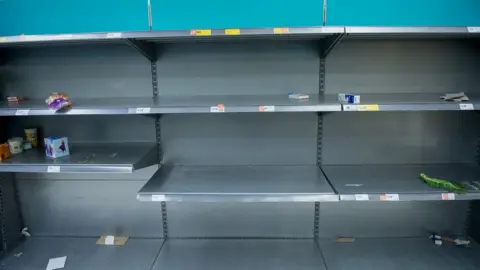 Getty Images
Getty ImagesBooths, which has stores across Lancashire, Cheshire, Cumbria and Yorkshire, has reserved shopping between 09:30 GMT and 11:00 GMT for the elderly and vulnerable, giving them priority.
Bosses have placed limits on items including soaps and sanitisers, cleaning products, medicines, baby care products and toilet paper, and customers have been urged to only buy what they need.
"If we all do this, then we can make sure we have enough for everyone," a statement from Booths said.
"Local communities are important, and you might ask friends and neighbours if they need help with their shopping. Sharing the shopping will help the vulnerable to stay well," it said.
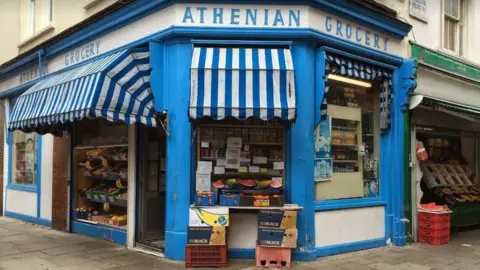 Google
GooglePan Iacovou, the manager of Athenian Grocery in Bayswater, London, said overcrowding had been a problem at the shop.
He said he had been forced to operate a system in which he let in small groups of people, shut the doors, then let another group of queuing customers in once they had left.
Mr Iacovou said he had noticed an increase in non-Greek and younger customers and that he had shut down the shop's website as he was unable to make up the orders.
The grocers had been able to keep supplies and shelves stocked up because the owner also owned a wholesalers, but his boss was concerned as the lockdown in Greece meant there could be a delay in deliveries, he added.

- EASY STEPS: How to keep safe
- A SIMPLE GUIDE: What are the symptoms?
- GETTING READY: How prepared is the UK?
- MAPS AND CHARTS: Visual guide to the outbreak
- TRAVEL PLANS: What are your rights?
- PUBLIC TRANSPORT: What's the risk?

